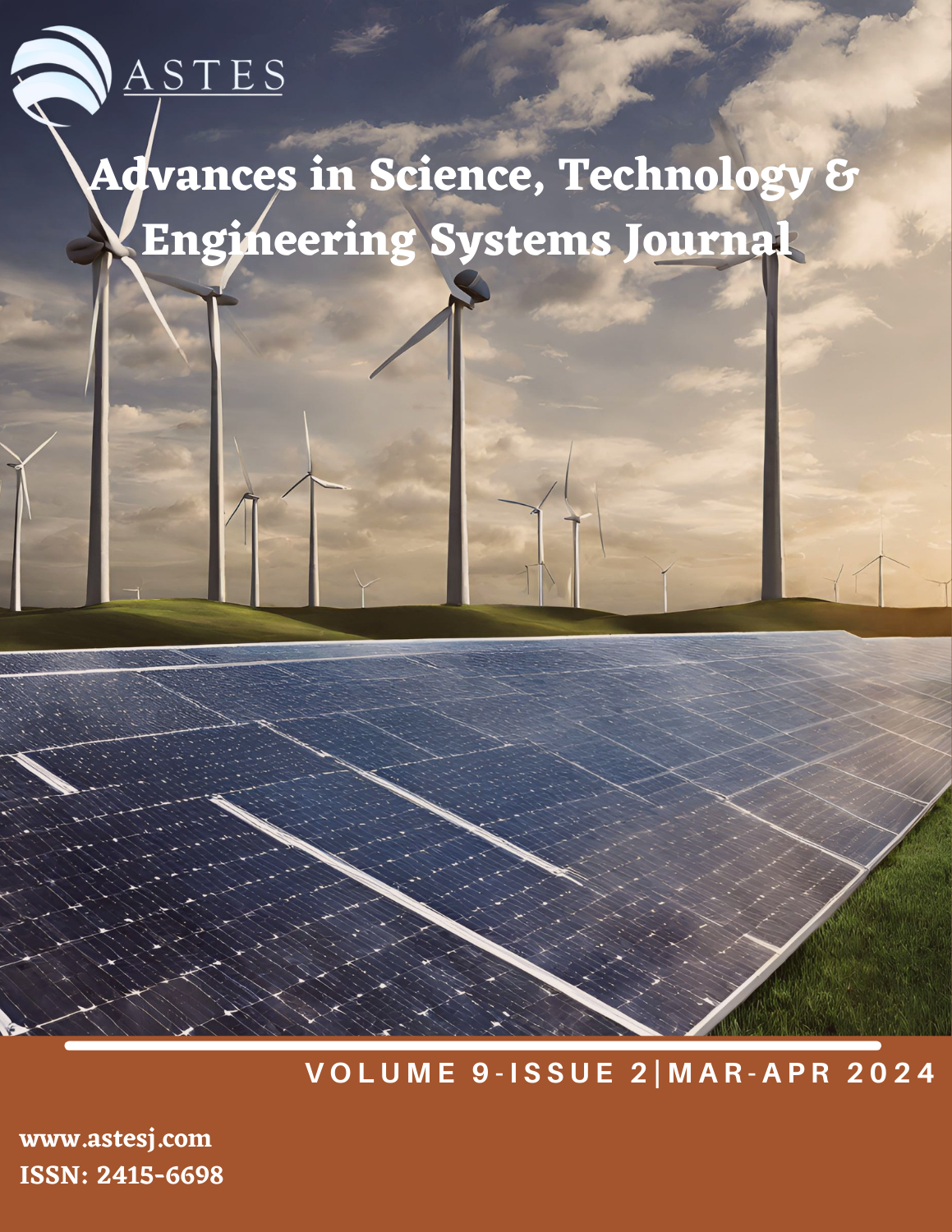Download Complete Issue
This issue showcases 8 research papers covering a wide range of fields. It explores a methodology to improve power grid stability with increased solar and electric vehicle usage. Another study utilizes deep learning models to enhance accurate detection of Alzheimer’s disease stages. An innovative approach examines body mechanics to optimize CPR training effectiveness. Thailand’s royal development initiatives are chronologically analyzed, revealing socioeconomic impacts. Strategic guidance is provided for financial advisory services to integrate artificial intelligence capabilities. Privacy concerns surrounding digital health systems in N. Macedonia are investigated. Sustainable road construction techniques leveraging waste materials are proposed. Finally, Malaysia’s renewable energy policies and their regional energy security implications are assessed. These interdisciplinary studies offer valuable insights into complex challenges, demonstrating research’s transformative potential across diverse domains.
Editorial
Front Cover
Adv. Sci. Technol. Eng. Syst. J. 9(2), i-i, (2024);
Editorial Board
Adv. Sci. Technol. Eng. Syst. J. 9(2), ii-iii, (2024);
Editorial
Adv. Sci. Technol. Eng. Syst. J. 9(2), iv-v, (2024);
Table of Contents
Adv. Sci. Technol. Eng. Syst. J. 9(2), vi-vi, (2024);
Articles
Optimal Engagement of Residential Battery Storage to Alleviate Grid Upgrades Caused by EVs and Solar Systems
Rafi Zahedi Amirhossein Ahmadian, Chen Zhang, Shashank Narayana Gowda, Kourosh SedghiSigarchi, Rajit Gadh
Adv. Sci. Technol. Eng. Syst. J. 9(2), 1-8 (2024);
View Description
The integration of distributed energy resources has ushered in a host of complex challenges, significantly impacting power quality in distribution networks. This work studies these challenges, exploring issues such as voltage fluctuations and escalating power losses caused by the integration of solar systems and electric vehicle (EV) chargers. We present a robust methodology focused on mitigating voltage deviations and power losses, emphasizing the allocation of a Permitted Percentage (PP) of battery-based solar systems within residential areas endowed with storage capabilities.
A key facet of this research lies in its adaptability to the changing landscape of electric transportation. With the rapid increase of electric trucks on the horizon, our proposed model gains relevance. By tactically deploying PP to oversee the charging and discharging of batteries within residential solar systems, utilities are poised not only to assist with grid resilience but also to cater to the upcoming demands spurred by the advent of new EVs, notably trucks.
To validate the efficacy of our proposed model, rigorous simulations were conducted using the IEEE 33-bus distribution network as a designed testbed. Leveraging advanced Particle Swarm Optimization techniques, we have deciphered the optimal charging and discharging commands issued by utilities to energy storage systems. The outcomes of these simulations help us understand the transformative potential of various PP allocations, shedding light on the balance between non-battery-based and battery-based solar residences. This research underscores the need for carefully crafted approaches in navigating the complexities of modern grid dynamics amid the anticipated increase in electric vehicles.
Double-Enhanced Convolutional Neural Network for Multi-Stage Classification of Alzheimer’s Disease
Pui Ching Wong, Shahrum Shah Abdullah, Mohd Ibrahim Shapiai
Adv. Sci. Technol. Eng. Syst. J. 9(2), 9-16 (2024);
View Description
Being known as an irreversible neurodegenerative disease which has no cure to date, detection and classification of Alzheimer’s disease (AD) in its early stages is significant so that the deterioration process can be slowed down. Generally, AD can be classified into three major stages, ranging from the “normal control” stage with no symptoms shown, the “mild cognitive impairment (MCI)” stage with minor symptoms, and the AD stage which depicts major and serious symptoms. Due to its generative features, MCI patients tend to easily progress to the AD stage if appropriate diagnosis and prevention measures are not taken. However, it is difficult to accurately identify and diagnose the MCI stage due to its mild and insignificant symptoms that often lead to misdiagnosis. In other words, the classification of multiple stages of AD has been a challenge for medical professionals. Thus, deep learning models like convolutional neural networks (CNN) have been popularly utilized to overcome this challenge. Nevertheless, they are still limited by the issue of limited medical images and their weak feature representation ability. In this study, a double-enhanced CNN model is proposed by incorporating an attention module and a generative adversarial network (GAN) to classify magnetic resonance imaging (MRI) brain images into 3 classes of AD. MRI images are obtained from the Open Access Series of Imaging Studies (OASIS) database and four experiments are done in this study to observe the classification performance of the enhanced model. From the results obtained, it can be observed that the enhanced CNN model with GAN and attention module has achieved the best performance of 99% as compared to the other models. Hence, this study has shown that the double-enhanced CNN model has effectively boosted the performance of the deep learning model and overcame the challenge in the multi-stage classification of AD.
Analysis of Components and Effects of Chest Compression Posture using CPR Training System
Taiki Yamakami, Akinori Minaduki
Adv. Sci. Technol. Eng. Syst. J. 9(2), 17-25 (2024);
View Description
Cardiopulmonary resuscitation (hereafter CPR) is a life-saving procedure to combat our day-to-day risks of cardiac arrest. However, there are a few citizens who can accurately carry out CPR by encountering the scene of the cardiac arrest of others, and there are many unclear parts on the methods such as the correct attitude of CPR, and the condition which lacks the clear scientific reason becomes a problem. This study aims to investigate the lever arm of CPR (cardiopulmonary resuscitation) by Body tracking using Azure Kinect DK to determine the lever arm of CPR (cardiopulmonary resuscitation) by Body tracking. As a movement toward this goal, this time we analyzed the effect of hand up/down changes in CPR posture on CPR and posture from a clear numerical value of joint angle.
Spatial Distribution Patterns of the Royal Development Projects Initiated by King Rama 9th of Thailand
Puntip Jongkroy, Ponthip Limlahapun
Adv. Sci. Technol. Eng. Syst. J. 9(2), 26-32 (2024);
Revolutionizing Robo-Advisors: Unveiling Global Financial Markets, AI-Driven Innovations, and Technological Landscapes for Enhanced Investment Decisions
Marco I. Bonelli , Jiahao Liu
Adv. Sci. Technol. Eng. Syst. J. 9(2), 33-44 (2024);
View Description
Robo-advisors, fundamental to the financial services sector, have undergone substantial technological metamorphosis. Innovations in artificial intelligence, blockchain, cloud technology, augmented reality, and virtual reality have reshaped the financial industry’s landscape. As automated investment solutions, robo-advisors are on the brink of further technological evolution. This comprehensive research amalgamates historical data, behavioral insights, and emerging market trends to provide technology-centric recommendations for the robo-advisory industry. Emphasizing the significance of a global perspective, the study explores the adoption of full-scale optimization in portfolio construction and the integration of digital twin capabilities. It delves into the burgeoning realm of Natural Language Processing facilitated by AI-driven chatbots in financial technology companies. These recommendations stand as pivotal pillars for steering the ongoing technological advancements of robo-advisors in the ever-evolving landscape of the financial sector.
Exploring Current Challenges on Security and Privacy in an Operational eHealth Information System
Viktor Denkovski, Irena Stojmenovska, Goce Gavrilov, Vladimir Radevski, Vladimir Trajkovik
Adv. Sci. Technol. Eng. Syst. J. 9(2), 45-54 (2024);
View Description
Bearing in mind that patient data is extremely sensitive, it is crucial to establish strong protection when the security and privacy of healthcare data are concerned. Prioritizing data security and privacy is essential for the overall healthcare industry in order to maintain the reliability of electronic healthcare (eHealth) information systems. This study explores the gathered data and information from the surveys and interviews by looking at the security and privacy concerns in using eHealth information technologies. The surveys and interviews were performed on the medical practitioners in N. Macedonia. The main goal is to find out how well-informed are the medical practitioners on the already in-place privacy measures that have been implemented by the medical authorities and to assess their attitudes regarding the need for additional improvements of the system. From the executed interviews, eight healthcare professionals participated in a thorough email interview in order to discover security and privacy issues associated with eHealth systems usage. This information served as the groundwork for administrating an online survey, to which 370 medical practitioners responded from primary and secondary healthcare. The findings emphasize how essential it is to promptly address the system usability concerns on the security and privacy procedures that are implemented when using eHealth technologies.
Buton Rock Asphalt Paving Block Innovation using Waste Engine Oil and Recycled Concrete Aggregate
Sigit Pranowo Hadiwardoyo, Riana Herlina Lumingkewas, Tommy Iduwin, Silvanus Nohan Rudrokasworo, Darren Matthew
Adv. Sci. Technol. Eng. Syst. J. 9(2), 55-66 (2024);
View Description
Road surface coating using concrete paving block cement has been used for a long time. As an aggregate binding agent, asphalt can be made into paving blocks. Utilizing waste in the recycling process is an activity to control the sustainability of natural resources. Waste Engine Oil and Recycled Concrete Aggregate can be used as road pavement materials to reduce the use of new materials. Buton Rock Asphalt is natural asphalt in the form of hard asphalt granules and certain minerals that can be softened by waste engine oil with a content of 15% to increase penetration. The contribution of rock asphalt and used engine oil reduces the use of new asphalt by 67.33%. Furthermore, using recycled concrete aggregate by 24% can reduce the need for new aggregate. The innovation of asphalt paving block fabrication using a Hand-stimulus compactor with Marshall test control has demonstrated suitable performance as a structural material for road pavement. Using a modified rock asphalt mixture as paving blocks reduces construction costs because it does not require heavy equipment. This innovation is only for light to medium-traffic vehicle loads. Laboratory test results show that it is sufficient for this type of traffic.
Malaysia’s Renewable Energy Policy and its Impact on ASEAN Countries
WaiYie Leong, LeeSun Heng, YuanZhi Leong
Adv. Sci. Technol. Eng. Syst. J. 9(2), 67-73 (2024);
View Description
As the global community increasingly shifts its focus towards sustainable development and combating climate change, renewable energy policies have become pivotal in shaping national and regional energy landscapes. Malaysia, as a developing nation with a rapidly growing economy, has recognized the importance of renewable energy sources in achieving its socio-economic goals while addressing environmental concerns. This paper explores Malaysia’s renewable energy policy framework and assesses its impact on neighboring countries in the Southeast Asian region. Through a comprehensive analysis of policy measures, incentives, challenges, and achievements, this paper elucidates the significance of Malaysia’s renewable energy endeavors in fostering regional energy security, sustainability, and cooperation.

